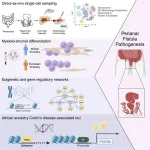(Press-News.org)
One day you hear that red wine is good for your heart. The next day, it’s not. The same goes for chocolate. And coffee. The see-saw of contradicting information isn’t anything new, but what happens when clinicians hear conflicting studies about a medication they use for their patients? Researchers at the Perelman School of Medicine at the University of Pennsylvania are hoping to use, among other methods, a variety of artificial intelligence to help sort that out.
Ellen Caniglia, ScD, an assistant professor of Epidemiology and Enrique Schisterman, PhD, a professor and the chair of the Department of Biostatistics, Epidemiology, and Informatics (DBEI), received a $1 million grant from the Patient-Centered Outcomes Research Institute (PCORI) to develop a system that would allow clinicians to weigh the results of two conflicting clinical trials and make an informed choice about how those findings should influence their patients’ treatment.
“Clinicians and policymakers need user-friendly tools to understand why seemingly identical studies could produce conflicting results,” said Caniglia. “With a tool like that, we can be much more confident in what is being recommended and help patients make informed decisions, as well as identify those who may benefit or be harmed by a treatment being considered.”
Conflicting information or guidance on treatments used for patients are not uncommon. A high-profile recent example is aducanumab, which had been used among those with Alzheimer’s disease with the idea of targeting plaque build-ups in the brain. It was given accelerated approval by the FDA in 2021, was embroiled in controversy, both in its trial results and over the mechanisms and process surrounding that approval. Eventually, it was discontinued by its maker.
Comparing conflicting studies of a preventive drug for preterm birth
Caniglia and Schisterman will partner with other Penn Medicine investigators in DBEI and the Department of Obstetrics and Gynecology to complete work on the decision-support system. Joining them will be Eric Tchetgen Tchetgen, PhD, a professor of Biostatistics; Lisa Levine, MD, MSCE, chief of Maternal Fetal Medicine; and Beth Pineles, MD, PhD, an associate professor of Obstetrics and Gynecology.
Their work will begin by comparing a pair of studies that examined the use of a medication called 17-alpha-hydroxyprogesterone caproate (17P). A weekly injection, 17P was recommended for pregnant individuals who previously had a preterm birth to prevent it in their current pregnancy. One study from 2003 found that 17P gave significant protection against having a preterm birth, but a second study published in 2019 found no effect.
As a result of the second study, the FDA and other national medical organizations rescinded their support for the use of 17P in preventing preterm births, leading to hospitals around the country to stop routinely administering it.
But why did these studies differ?
“We still have many residual questions as to why it worked in one large trial and not another,” Caniglia said. “So, we’re aiming to develop methods and software that could uncover how variations in study findings are explained by things like hidden differences in study populations, the extent to which study participants follow the protocol, and, ultimately, what harm or benefit may come to individuals receiving the treatment.”
Deeper analysis to understand differences in studies
Caniglia, Schisterman, and the research team will develop and apply novel causal inference—a discipline of investigation that considers assumptions and tries to drill deeper to the cause of something—and machine learning—a variety of artificial intelligence that “learns” by analyzing large datasets— in their effort to reconcile results of conflicting trials. They’ll then build their decision-making system for comparing studies using what they learned.
The work is supported by PCORI’s Improving Methods for Conducting Patient-Centered Outcomes Research Cycle 2 2023 funding opportunity. It’s a funding program designed to “address important methodological gaps and lead to improvements in the strength and quality of evidence” used in research to generate better patient outcomes.
Caniglia and her team will receive $1 million spread out over three years of work.
“If we can create something that helps clinicians and policymakers faced with conflicting results from randomized trials better decide whether a treatment should be available—and to which populations—our efforts will be a success,” said Caniglia.
The award has been approved pending completion of a business and programmatic review by PCORI staff and issuance of a formal award contract.
END
New research has discovered that neotame, one of the new generation of artificial sweeteners, is capable of damaging the human intestine and causing illness.
The study is the first to show that neotame can cause previously healthy gut bacteria to become diseased and invade the gut wall – potentially leading to health issues including irritable bowel syndrome and sepsis – and also cause a breakdown of the epithelial barrier, which forms part of the gut wall.
The research, which is published in the journal Frontiers in Nutrition and was carried out at Anglia Ruskin ...
In a proof-of-concept study, researchers demonstrated the effectiveness of a potential new therapy for Timothy syndrome, an often life-threatening and rare genetic disorder that affects a wide range of bodily systems, leading to severe cardiac, neurological, and psychiatric symptoms as well as physical differences such as webbed fingers and toes. The treatment restored typical cellular function in 3D structures created from cells of people with Timothy syndrome, known as organoids, which can mimic the function of cells ...
HOUSTON ― The University of Texas MD Anderson Cancer Center’s Research Highlights showcases the latest breakthroughs in cancer care, research and prevention. These advances are made possible through seamless collaboration between MD Anderson’s world-leading clinicians and scientists, bringing discoveries from the lab to the clinic and back.
Recent developments at MD Anderson offer insights into a novel targeted therapy for rare cancers, the role of enhancer RNAs in cell differentiation, novel biomarkers for the prognosis and treatment of pancreatic cancer, imaging signatures to stratify ...
Crossing a busy street safely typically is a result of a social exchange. Pedestrians look for cues—a wave, a head nod, a winking flash of the headlights, and, of course, a full vehicle stop—to know it’s safe to cross.
But those clues could be absent or different with self-driving vehicles. How will children and adults know when it’s safe to cross the road?
In a new study, University of Iowa researchers investigated how pre-teenage children determined when it was safe to cross a residential street with oncoming self-driving cars. The researchers found children made the ...
Mount Sinai researchers have published the first study to use single-cell analysis in identifying several pathophysiological mechanisms of abnormal passageways in the digestive system known as perianal fistulae, a common complication of Crohn’s disease. These findings were published in the journal Med on April 24.
Crohn’s disease is an inflammatory bowel disease that causes chronic inflammation at any part of the gastrointestinal (GI) tract and impacts more than half a million people in the United States. Perianal fistulae, abnormal connections between the anal canal and perianal skin, are a common complication of Crohn’s disease that often result in ...
HOUSTON – (April 24, 2024) – People say “When pigs fly” to describe the impossible. But even if most mammals are landlubbers, the ability to glide or fly has evolved again and again during mammalian evolution, in species ranging from bats to flying squirrels. How did that come about? In a study published in the journal Nature this week, a team of researchers led by Princeton University and Baylor College of Medicine explains the genomic and developmental basis of the patagium, the thin skin membrane that allows some mammalian species to soar through the air.
“We don't quite understand how novel traits and adaptations originate from a molecular ...
About The Study: In this cohort study of pediatric enrollees across three commercial health insurance databases, statistical signals detected for myocarditis or pericarditis after BNT162b2 (ages 12-17 years) were consistent with previous reports, and seizures after BNT162b2 (ages 2-4 years) and mRNA-1273 vaccinations (ages 2-5 years) should be further investigated in a robust epidemiologic study with confounding adjustment. The Food and Drug Administration concludes that the known and potential benefits of COVID-19 vaccination outweigh the known and potential risks of COVID-19 infection.
Authors: Patricia C. Lloyd, Ph.D., Sc.M., of the Food and Drug Administration in Silver ...
About The Study: This analysis shows that declines in heart failure-related mortality from 1999 to 2012 have been entirely undone by reversals from 2012 to 2021, meaning that contemporary heart failure mortality rates are higher than in 1999. The origins of these reversals preceded the COVID-19 pandemic, although the larger increases in 2020 to 2021 indicate that the pandemic may have accelerated them due to limitations to health care access and possible cardiac involvement.
Authors: Marat Fudim, M.D., M.H.S., of Duke University in Durham, North Carolina, is the ...
About The Study: In this repeated cross-sectional study, there was no evidence that recreational marijuana laws were associated with encouraging youth marijuana use, based on both the logistic regression and interaction-weighted models.
Authors: D. Mark Anderson, Ph.D., of Montana State University in Bozeman, is the corresponding author.
To access the embargoed study: Visit our For The Media website at this link https://media.jamanetwork.com/
(10.1001/jamapsychiatry.2024.0698)
Editor’s Note: Please see ...
In a significant development in the field of superconductivity, researchers at The University of Manchester have successfully achieved robust superconductivity in high magnetic fields using a newly created one-dimensional (1D) system. This breakthrough offers a promising pathway to achieving superconductivity in the quantum Hall regime, a longstanding challenge in condensed matter physics.
Superconductivity, the ability of certain materials to conduct electricity with zero resistance, holds profound potential for advancements of quantum technologies. However, achieving superconductivity in the quantum Hall regime, characterised by quantised electrical conductance, has proven to be a mighty ...


